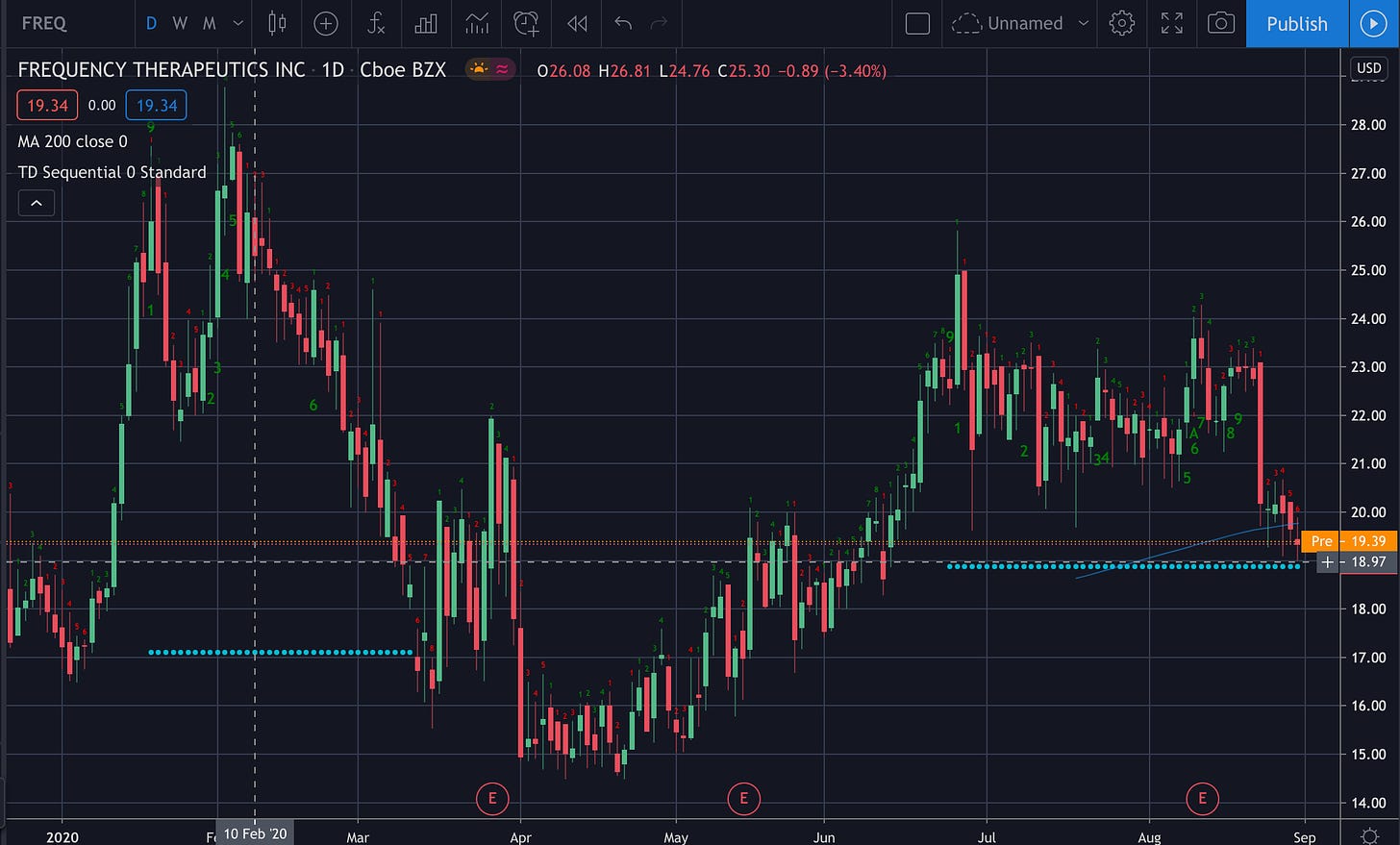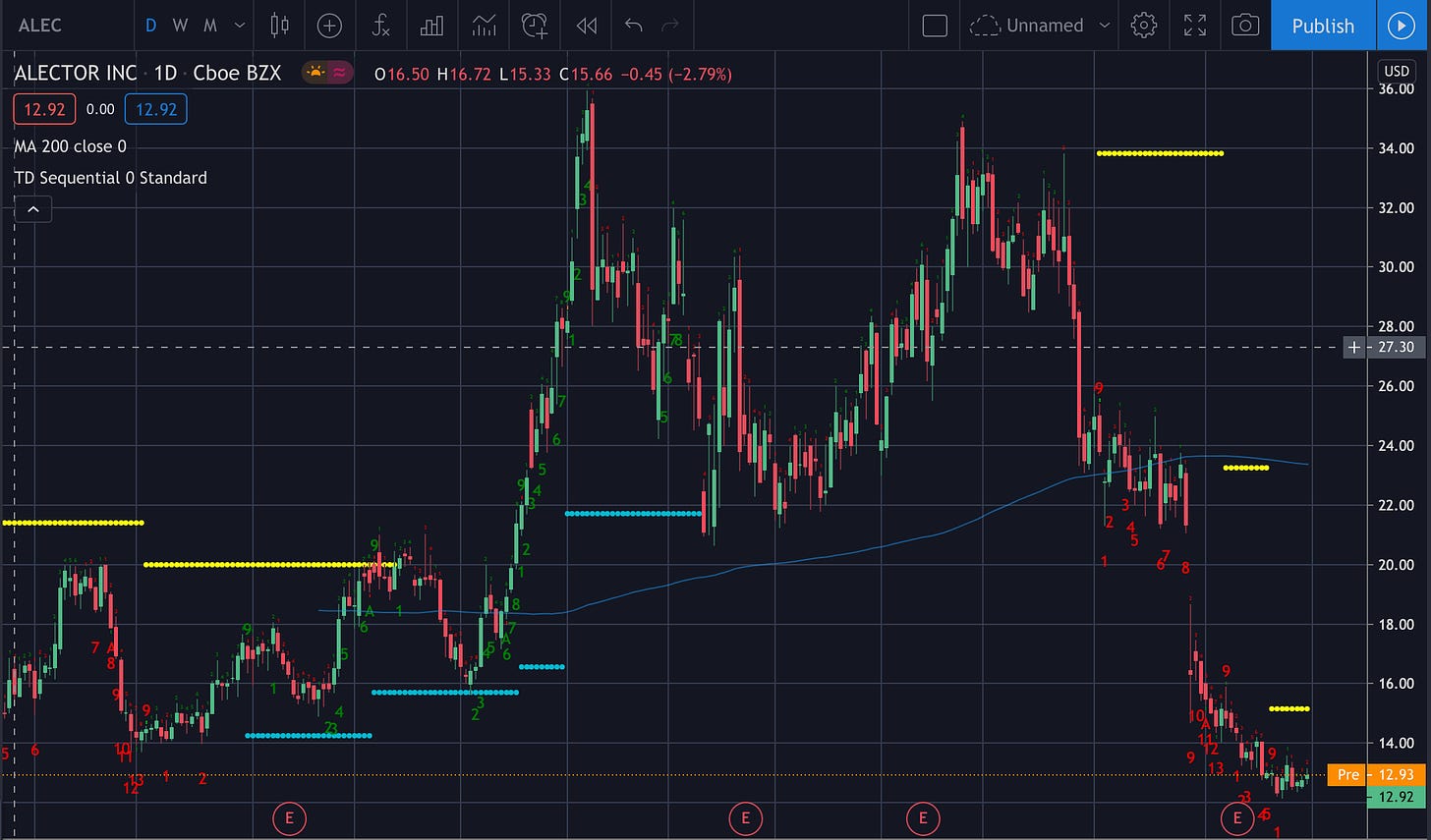Top 16 Longevity Stocks in 2020 Analyzed

- Longevity biotechnology is a promising investing opportunity that British billionaire Jim Mellon believes will be the biggest industry in history.
- It is still early days in the longevity biotech industry. There are only 16 anti-aging biotech stocks listed on LongevityMarketcap.com
- In this article, we do a quick survey of each of the 16 publicly-traded longevity biotech companies.
- Check out Longevity List for a full list of longevity startups.
Hot or Not: A breakdown of the best longevity biotechnology stocks on LongevityMarketcap.com
LongevityMarketcap.com is a website that tracks all the publicly-traded longevity biotechnology stocks. Currently there are 16 stocks listed.
Let’s do a breakdown of all 16 longevity stocks, and why they are in or out of my portfolio. We’ll start from the top (by marketcap):
1. Grifols S.A ($15.63 B)
Grifols (GRFS) is a Spanish blood protein and chemicals company and the largest company on LongevityMarketcap by far. It’s more of a “blue chip” blood biochemicals company than a pure anti-aging speculative biotech.
Hot
- Has a 45% stake in the notable longevity startup, Alkahest (they do young blood / old blood plasma factors — chronokines)
- Also recently published results of their AMBAR trial that used albumin replacement to treat Alzheimer’s disease. A combination of albumin replacement and a proprietary immunoglobin slowed the progression of Alzheimer’s disease over 14 months. Not a huge result but it is notable. An interesting background read on AMBAR can be found on Josh Mitteldorf’s blog.
- Shares are dual listed (depository) and available on the Nasdaq.
Not
- Grifols is a big company and their anti-aging projects (Alkahest / Alzheimer disease treatment) only represents a small percentage of the company. If you invest, you are mostly investing in a biologics supply manufacturer.
Verdict: If I could only invest in Alkahest, I would. Currently, I think investing in Grifols is too dilutive with its non-longevity business.
2. Denali Therapeutics ($3.38 B)
Denali Therapeutics (DNLI) is a developer of drugs that targets neurodegenerative disease. According to Gregory Bailey (CEO of Juvenescence) in an interview on the Simple Biotech Podcast, neurodegeneration will be the major gating function on the limits of radical life extension.
Hot
- Denali’s main advantage is their blood-brain transport technology. Most small molecule, antibodies, and enzymes cannot easily cross the blood-brain barrier to maintain high concentrations in the brain. Denali uses a technology platform involving receptor-mediated transcytosis to move large macromolecules across the blood-brain barrier. Basically, they use molecules to bind to the endothelial cells of the blood-brain barrier, which then get actively transported into the brain.
- Biotech behemoth Biogen ($45 B marketcap) announced on August 6th that they would invest in Denali to co-develop their LRRK2 (leucine-rich repeat kinase) pipeline for Parkinson’s disease. The deal included $560 million dollars upfront.
Not
- A lot of high profile drug failures in this space already. Failure rate for Alzheimer drugs is 99%.
- For some psychological reason I find it hard to get excited about fighting aging in the brain — even though it may be the fundamental dealbreaker for life extension. Don’t get me wrong — I love my brain. But perhaps neuro-diseases are not as sexy as reversing cellular aging, which seems more fundamental.
Verdict: Biogen has made a big bet on this company. Might be worth a bet. Though, I expect failure to be the most likely outcome and will size appropriately.
3. Mesoblast ($2.3 B)
This Australian stem cell therapy company specializes in using allogenic mesenchymal stem cells and mesenchymal progenitor cells treat a variety of diseases, mostly related to inflammation or acute damage.
Hot
- Already has stem cell therapy products approved for use in Europe and Japan.
- Ryoncil received a favourable 9-1 vote from the FDA Oncology committee for use in pediatric steroid-refractive Graft vs Host Disease. It is likely the FDA will approve Ryoncil on September 30th.
- Although the company does not market itself as a longevity company, their stem cell therapy products all tend to target inflammation and or enable regeneration (Revascor, in the heart). They currently have a Phase III trial of a regenerative therapy targeting disc degeneration that causes age-related chronic low back pain.
Not
- The usual suspects with cell therapies: manufacturing and administration is trickier.
Verdict: I’m already invested in Mesoblast. I think they are developing some great rejuvenation technology that could be translated to more broad areas of aging (inflammaging, regeneration) in the future.
4. ALX Oncology ($1.49 B)
ALX Oncology (ALXO) is a Longevity Fund backed immuno-oncology company that focuses on inhibiting the CD47 cell surface protein that helps cancer cells evade the immune system.
Hot
- The whole field of immuno-oncology is very hot in biotech right now.
- Age-related CD47 overexpression may be linked with reduced vascular function. So possible translational work for anti-aging.
Not
- Fresh off its IPO in July, the stock still has too much hype for me to decide on investing.
Verdict
This looks like a promising immuno-oncology play that could also target aging in the future. Unfortunately, I don’t know enough about this stock to warrant investing during the post-IPO hype phase. If it (ever) drops to 15$ / share I would consider it.
5. Alector ($1.02 B)
Alector (ALEC) is a neurodegenerative drug developer that has a unique immunotherapy approach. They aim to functionally repair genetic mutations that impair the immune system of the brain.
Hot
- Novel twist on neurodegenerative disease and immunology
- Perhaps technology can translate to immuno-senescence as a whole
- Strong $500+ million in cash on balance sheet. Partnerships with big pharma
Not
- High failure rates for Alzheimer’s disease drugs (99%)
Verdict: Same as Denali Therapeutics and all other large neurodegeneration biotechs. Extremely high failure rates so plan accordingly.
6. Frequency Therapeutics ($650 M)
Don’t be fooled. Frequency Therapeutics (FREQ) sounds like a company that is focussed primarily on restoring hearing loss. Indeed, that’s the main pipeline.
But actually the company has an ambitious plan to extend its small molecule targeted regenerative medicine approach to all parts of the body. Their drugs aim to stimulate inactive progenitor cells in target organs to regenerate functional tissues. They are currently conducting Phase II trials for sensorineural hearing loss.
Hot
- Progenitor Cell Activation (PCA) has potential broad regenerative ability.
- Sensorineural hearing loss is a huge market, especially in aging population
- Has the first clinical data to ever demonstrate improvements in hearing
- FDA Fast Track designation.
Not
- Nothing that I can tell so far.
Verdict: I am a fan. As a guy who played drums back in the day and suffers from some hearing loss, I feel like this is personal.
7. Athersys ($430 M)
Athersys (ATHX) is a stem cell therapy company much like Mesoblast. However instead of using mesenchymal stem cells (MSC) they develop a proprietary Multipotent Adult Progenitor Cell (MPAC) derived from bone marrow. They currently have clinical trials investigating treatment for ischemic stroke and acute respiratory distress syndrome (ARDS, for Covid-19).
Hot
- MPACs are claimed to have superior cell differentiation ability compared to MSCs.
- Broad regenerative / anti-inflammation potential
- “Off the shelf” product
Not
- Similar to Mesoblast and other cell therapies. Manufacturing is trickier (compared to small molecule). Harder to target intracellular causes of aging.
Verdict: This company has many similarities with Mesoblast so it may also warrant an investment out of principal. I will keep my eye on it.
8. Unity Biotechnology ( $160 M)
Unity Biotechnology (UBX) develops drugs that target senescent cells — cells that stop dividing and, instead of dying, secrete harmful factors that are implicated in causing aging.
Hot
- The only publicly-traded company that targets senescent cells — a major hallmark of aging.
- Strong backing from The Longevity Fund, Founders Fund (Peter Thiel), Bezos Expeditions, ARCH Venture Partners, etc.
- Recent stock price implosion (-70%) from failed osteoarthritis trial (I’ve written extensively on this, see #005, #006). Perhaps the valuation is “cheap” now.
Not
- Failed trial potentially casts doubt on senolytics and senescent cell hypothesis.
Verdict: I’m already invested. It’s the only publicly-listed senolytics company and at these prices I might be tempted to increase my bet.
9. Lineage Cell Therapeutics ($137 M)
Lineage Cell Therapeutics (LCTX), formerly BioTime, is a cell therapy company that uses pluripotent cells to treat age-related degenerative diseases and other serious conditions. They currently have Phase II trials targeting Dry Age-related Macular Degeneration and also Spinal Cord Injury. A Phase I trial of a cancer vaccine that stimulates the immune system against telomerase is in the process of enrolment.
Hot
- Broad regenerative medicine mission
- Mike West (OG of stem cell therapy and now at AgeX Therapeutics) was CEO of the company.
Not
- Stock price is down 96% from its highs. That’s usually not a good sign.
- Cellular therapies can be tricky to manufacture. Also has limitations on what they can target due to nature of interaction.
Verdict: A massive 96% drawdown is a huge red flag to me. I am staying away until I can do better due diligence.
10. Gensight Biologics (94 €M)
Gensight Biologics (SIGHT.PA) is one of the weirdest companies on this list. Weird is good.
They specialize in using gene therapy to target rare inherited retinal diseases such as Leber Hereditary Optic Neuropathy (LHON).
LHON results from a mutation affecting the ND4 mitochondrial gene. Their approach uses adeno-associated virus vectors to express the ND4 gene in the nucleus. Mitochondrial Targeted Sequence (MTS) shuttles ND4 messenger RNA from the nucleus to the membrane of the mitochondrion to synthesize the missing protein.
Hot
- Really unique gene therapy approach to retinal diseases
- MTS technique has potential to solve other conditions related to mitochondrial mutations / dysfunctions that cause aging.
Not
- No comment.
Verdict: I don’t know enough about rare disease trials or gene therapy. There is certainly less stigma associated with gene therapy now after Spark Therapeutics’ commercial success. More research needed.
11. resTORbio ($83 M)
resTORbio (TORC) is a small molecule drug company that develops rapalogs (i.e. rapamycin analogs) to treat age-related disease. Rapamycin is an immunosuppressant drug that also happens to increase the lifespan of mice up to 60%. Currently the company is in Phase 2 trials of a combination rapalog + rapamycin to treat Parkinson’s disease.
Hot
- Only publicly traded company targeting the mTOR pathway — one of the most popular pathways studied in aging.
Not
- Big failure of their respiratory disease trial at the end of 2019 caused the stock to drop 86%
- In April 2020, resTORbio announced a merger with Adicet Bio, a CAR-T cell therapy company. The combined company will take on Adicet Bio’s name and the shareholders of Adicet Bio will own 75% of the new company. resTORbio shareholders announced a lawsuit against the board of directors.
Verdict: The high profile clinical trial failure, weird merger, and lawsuit are big enough red flags for me to stay away from this company. People in the longevity company had high hopes for this company.
12. Stealth BioTherapeutics ($76 M)
Stealth BioTherapeutics (MITO) is a company that develops drugs that target mitochondrial disorders, dysfunctions, and diseases. Their main pipeline revolves around Elamipetride, which is currently being tested in Phase III clinical trials for Barth Syndrome — a rare disease of multiple systems.
Hot
- A pure longevity small molecule play that targets a central pillar of aging — mitochondrial dysfunction
Not
- Big Phase III trial failure of elamipetride to treat patients with primary mitochondrial myopathy (PMM) in Dec 2019.
- Stock is down 93% from its highs.
Verdict: Reusing the same failed compound to treat an another mitochondrial dysfunction might be a little risky. I’m staying away from this one.
13. Organovo ($56 M)
Organovo (ONVO) is a 3D bioprinting company that makes tissues for research purposes and drug testing. They specialize in printing a variety of 3D tissues using human cells and biogel fillers to simulate real in vivo conditions versus 2D cellular plate cultures.
Hot
- Not a therapeutics company. They sell a tool for research and drug testing.
- Technology improvements coupled to advances in traditional 3D printing?
- Included in ARK Invests “Genomics” Revolution” thematic ETF
Not
- 20-1 reverse stock split in August 2020.
- Share price is down 96% from all time highs
Verdict: Not a fan. The reverse split and massive drawdown aren’t enough to convince me to invest.
14. CohBar ($42 M)
CohBar (CWBR) is a company that develops therapeutics using mitochondrial peptides (short strings of amino acids). They currently are in Phase 1 clinical trials for treating NASH (a type of nonalcoholic fatty liver disease) and obesity.
Hot
- Co-founded by heavyweights in longevity academia: Nir Barzilai and David Sinclair
- Clearly focussed on a major hallmark of aging: Mitochondrial dysfunction.
Not
- CohBar announced a dilutive share sale below the market price in order to raise ~$15 in cash last week.
Verdict: The recent crash caused by the share sale might be a represent a good entry. No comment either way.
15. Biophytis (35,84 €M)
Biophytis (ALBS.PA) is a French company that is developing drugs inspired by medicinal plant metabolites to treat sarcopenia (age-related muscle loss). They are currently running a Phase II clinical trial.
Hot
- Clearly marketed as a pure-play longevity therapeutics company
- Unique hypothesis: Using stressed-plant metabolites as candidates to find drugs to treat conditions of aging. This xenohormesis idea is discussed in David Sinclair’s book Lifespan
Not
- No comment. Seems like a very small company. Extra risky.
16. AgeX Therapeutics ($33 M)
AgeX Therapeutics (AGE) is a pre-clinical company that is developing stem cell therapies and induced tissue regeneration in order to target aging and age-related diseases.
Hot
- Juvenescence-backed company
- Founder, Mike West, is an OG in stem cell research
Not
- Latest earnings report showed signs of financial distress
Verdict: I’m already invested but technically speaking the stock chart looks pretty precarious. It’s a very small pre-clinical company so I am keeping my position size small.
Conclusions
Even though it is early days in the longevity industry (aka the future world’s biggest industry) there are still a good number of investible stocks. And more will be coming.
As the number of publicly-traded longevity stocks grows we will need some sort of Longevity Biotech ETF that would make owning a diversified portfolio of these companies less onerous.
Technical Analysis
Alector (ALEC)
This neurodegeneration therapeutics stock took a tumble at the end of July due to a report of logistical complications brought on by the pandemic during their phase II dementia trials.
Trials are expensive and delays or missed doses can cause issues with analyzing data after the fact. The stock is now down almost 50% since the report and has been slowly climbing up for the past two weeks. This seems like a potential bottom. I’m interested.
Frequency Therapeutics (FREQ)

I only seriously started considering this small molecule progenitor cell activator company this week after researching it for this newsletter.
The stock is down about 18% in a couple weeks with momentum indicators getting close to showing a reversal. If we reach a TD sequential 9 on Thursday I might buy at end of day.
—Nathan

